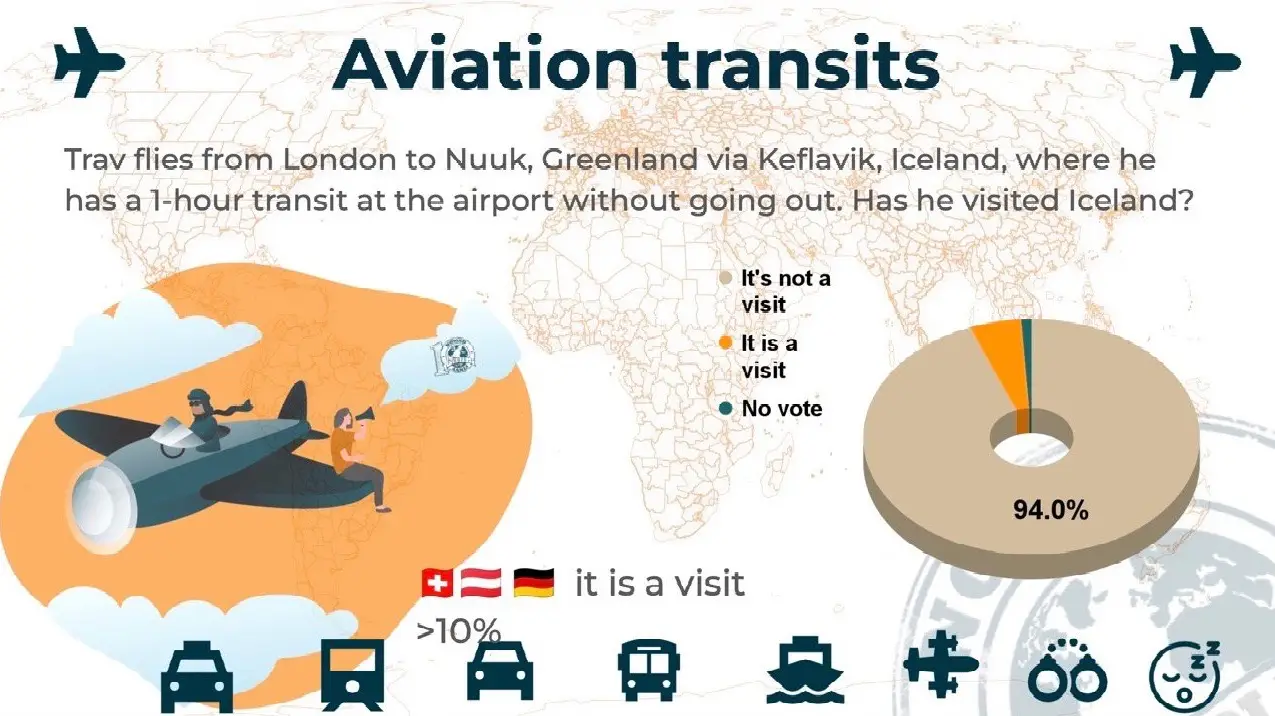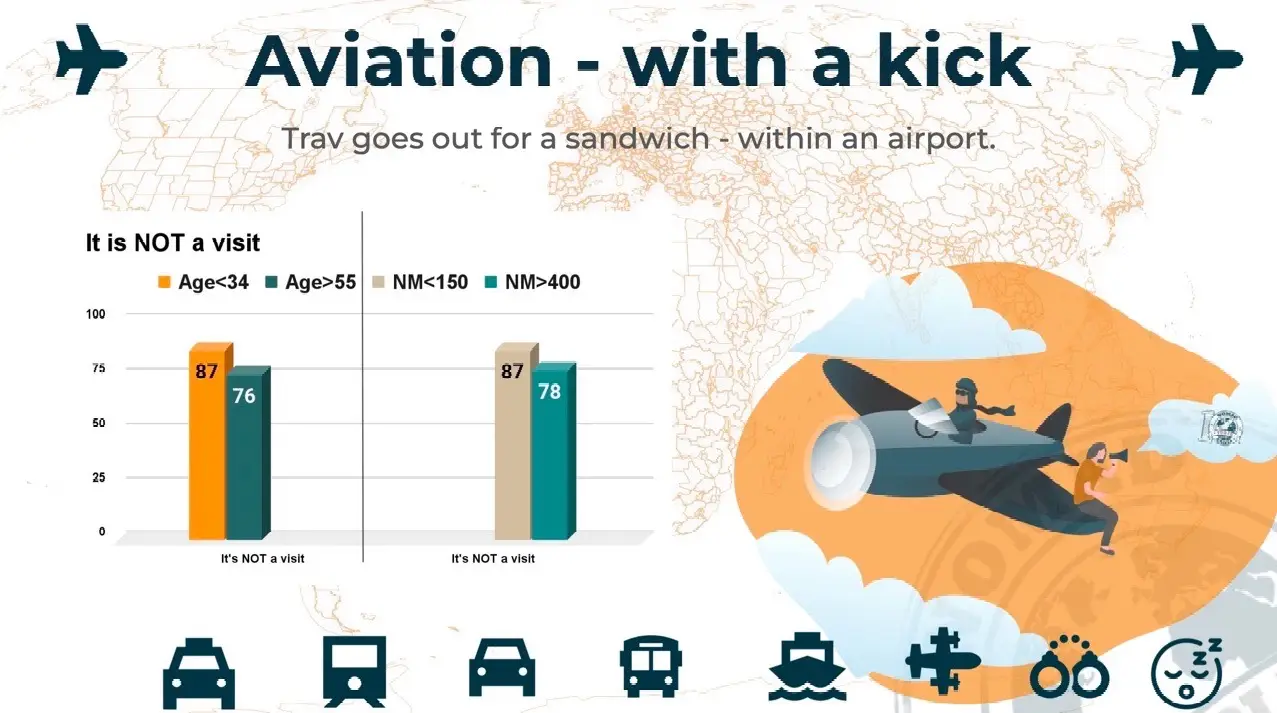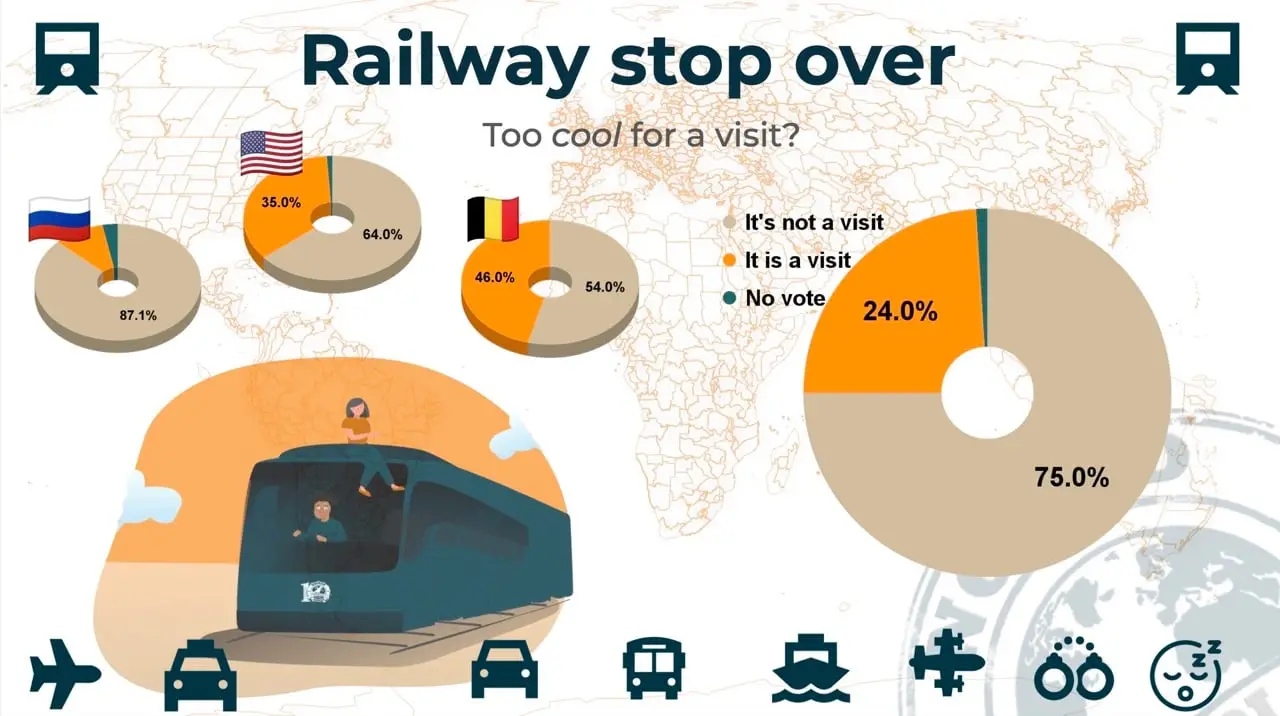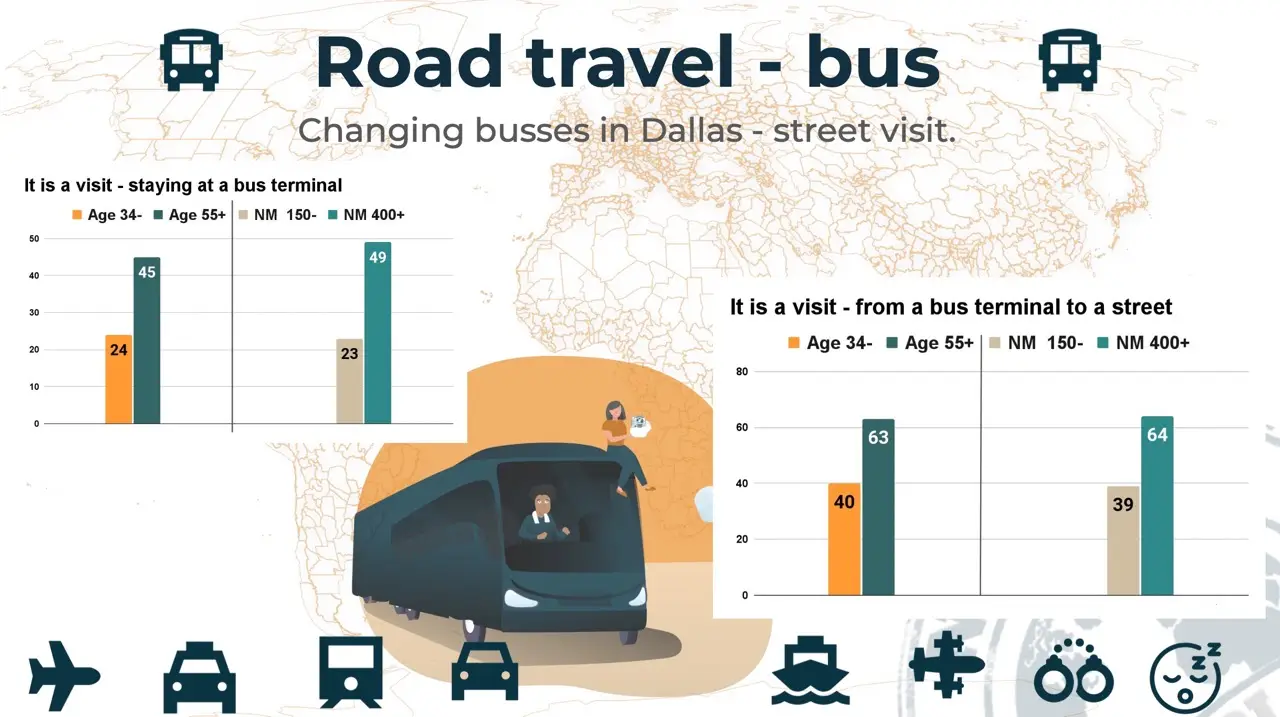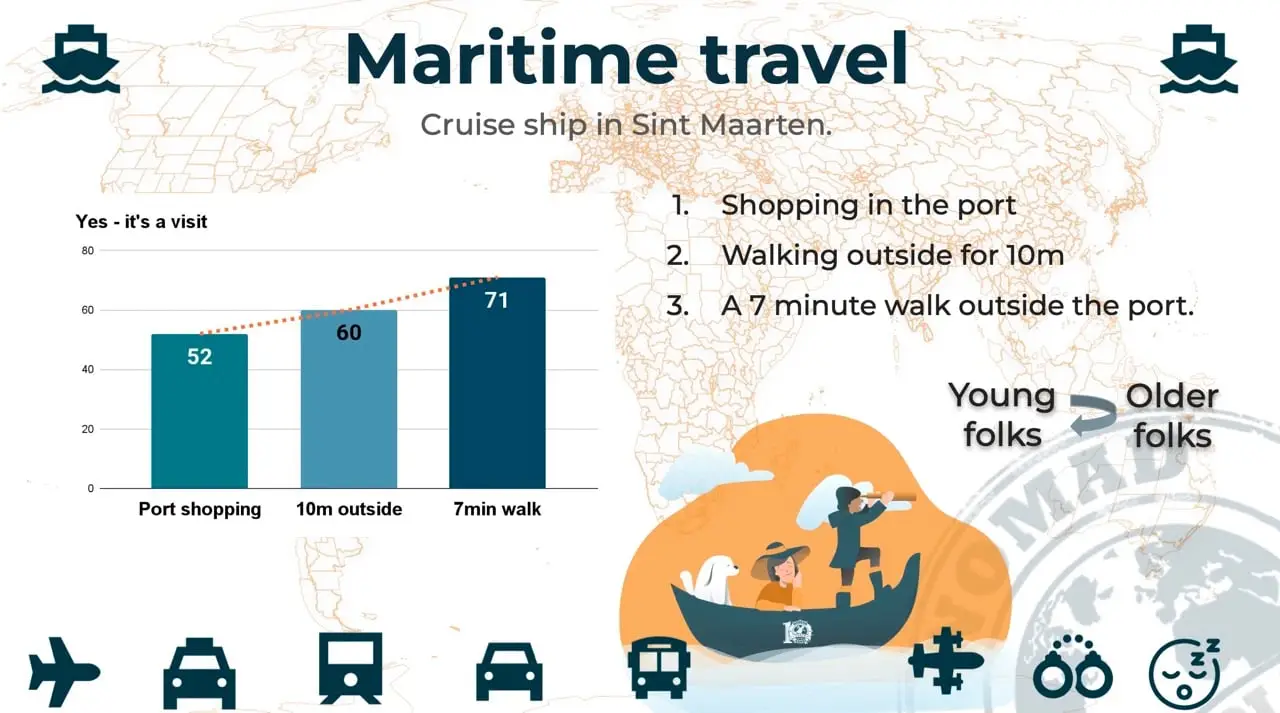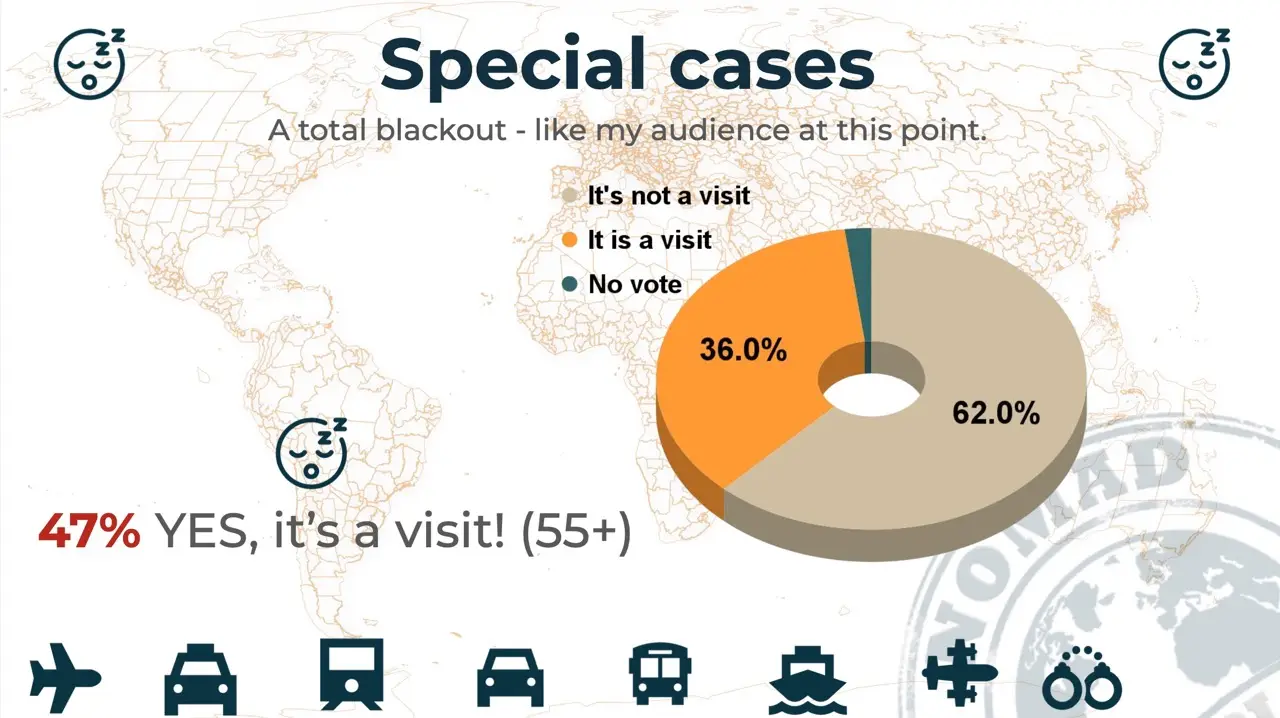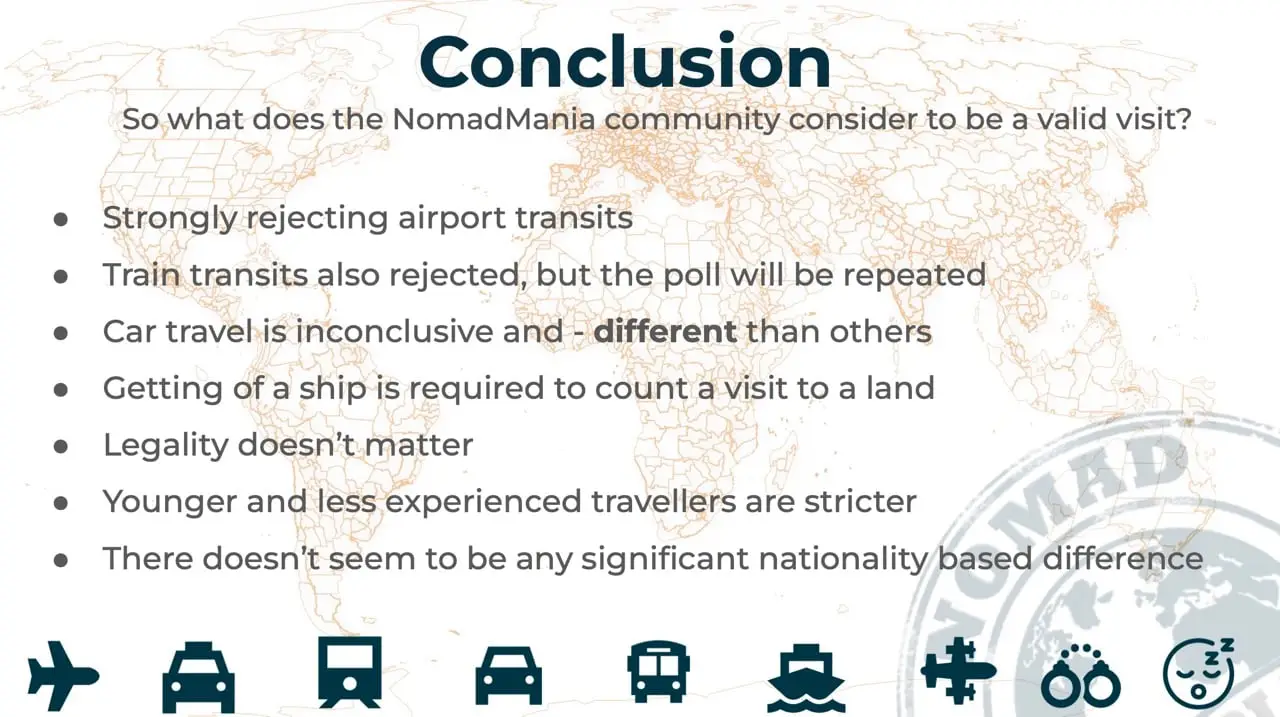One of the unique features of NomadMania is that we verify the travel achievements of members, thereby developing a trusted and engaging community. However, tehere is a never ending discussion regarding what should be considered a visit and what not.
So we decided to run a poll and leave it for you to decide. Here are the answers in regard to various travel situations.
Poll 1 (July – August 2022)
This poll was conducted between July and August 2022. Our manager at the time admitted that when she saw this poll and the sheer number and the scope of questions, she thought no one will bother to reply. But she knew she was wrong after replying to all of the questions herself, as she found herself drawn to read more and more including the sometimes silly and somewhat extreme situations that Trav and Ling find themselves in.
We ended up with 987 replies and a considerable amount of data. This is, of course, open for any discussion and interpretation that you may want to bring to the table, but we did draw some conclusions out of this.
If you are very much into this kind of stuff, we are providing a full analysis of the poll on this page, while we will present only some of the most interesting results below.
Our poll and presentation were split into different means of transit, that started with aviation. Here we share our very first question and the clearest result.
Our first firm conclusion, which was then confirmed in many other variations of similar questions – airport transits without leaving the ground of an Airport are NOT considered a visit to a country or a region.
The second question led our Trav outside of his terminal and immediately, we noticed a divergence in our results. This continued onward through our poll, so we made a clear split of the groups of travellers.
One concerned the respondents’ age and we have the two extremes here – travellers below 34 years old and travellers above 55 years old. These both groups were to show a slight divergence in terms of percentage of results, with older travellers tending to be more inclined to accept visits.
The other parameter involved travel intensity, or travel experience, with travellers split into those with less than 150 NomadMania regions and those with more than 400. Perhaps surprisingly, the more experienced travellers were more likely to accept visits than the less travelled ones.
Our next travelling theme was railway travel and here we received some not so unanimous results. This led us to a conclusion that more surveys are needed to reach a final consensus about what the community thought about what is or is not a visit.
Road travel, at least in the case of a bus, painted a similar picture as the previous two. It appears that our community is not so keen to accept any kind of visit that only includes stations/airports. The breaking point seems to be getting out of such places and seeing at least a bit – even if it’s just the Jackson street in Dallas or a roundabout in Addis Abbaba.
This was somewhat different with car travel, which included a bit more flexibility and not even leaving your car was needed to pay a good visit to a place assuming you had seen something or had a meaningful experience.
Maritime travel reminded us of our roots that include the infamous quick ‘touch down’ to the grounds of the place that we’re visiting in order to consider it visited. We could clearly see that the more time was spent walking in the location where Trav and Ling had sailed into, the more likely it was to be considered a visit by our community.
Finally, we included some special and bizarre cases that were both fun and ridiculous. We discovered that a totally blacked out ‘visit’ to a place is considered to be as a legitimate way to get to know a place by sometimes as many as 47% of our community members.
This all led to some head scratching moments and the big decision – we would repeat the poll in late November with similar, yet modified questions, in order to confirm the validity of the results so we could then create some firm policies.
In short – these were the conclusions that we shared. It still remains to be seen what course of action this will lead us to after we repeat the poll on ‘what is a visit’.
So stay tuned, follow what is going on with our main page and please, by all means, take part in the next poll. The last thing that we want to do is decide on such issues on our own and this is why it’s so important to cast your vote whenever you can.
Poll 2 (December 21-31, 2022)
We asked most aviation questions in our first poll, so this second one focused on other issues, including transit by land, with four questions presenting different versions of our mascot Ling’s transit from Greece to Serbia via North Macedonia.
Our poll indicates that the threshold is experiencing something significant. 59% reject the transit when this only involves a quick stop at a gas station even if Ling went out of the car to buy a bottle of water; however in the example where Ling did not get out of the car but drove around Skopje and saw the town, 62% did consider this a visit. Implication: putting your foot on the ground is not enough on its own, but it isn’t even necessary if you see something of the country. It goes without saying that just ‘crossing the line’ into a country/region is totally rejected as a consequence of this vote.
This extends to our example of Trav taking a train from Buchs, Switzerland to Feldkirch, Austria via Liechtenstein. Only 17% accept a transit without getting off the train as a visit; only 24% accept getting off at the platform as a visit; however, a quick visit outside the station for 10 minutes is accepted by 54% of respondents, in what is one of the closer votes in our poll.
In fact, the closest vote is shown below with a 50-49% split and 1% abstaining. In the example where Trav goes outside the bus station at Navoi, Uzbekistan for 10 minutes only, 50% accept the visit, with this percentage being higher for older and more experienced travellers; and much lower for younger and less experienced ones.
All we can say here is that you aren’t making it easy for us when the vote is so close, and that, truly, every vote counts!
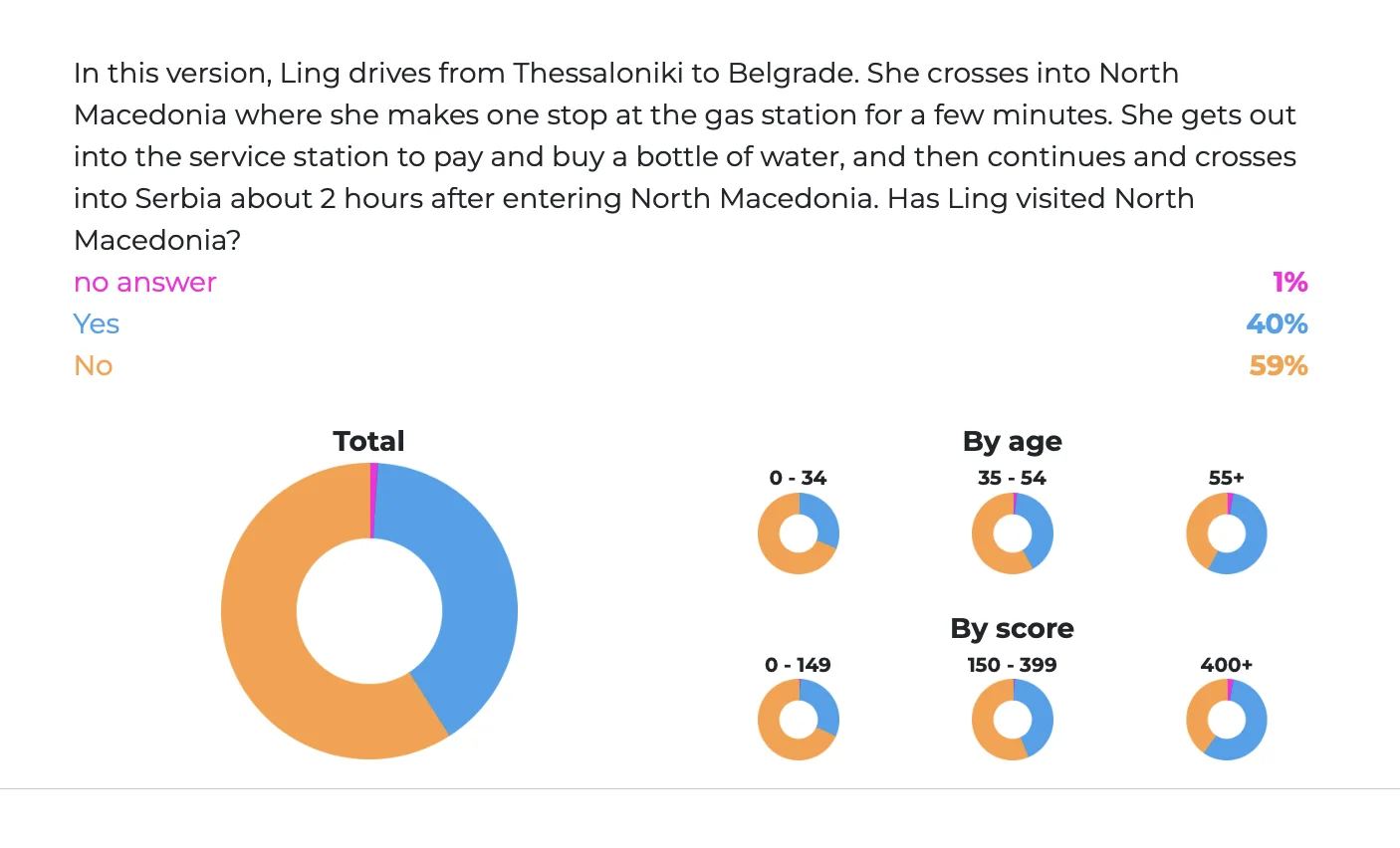
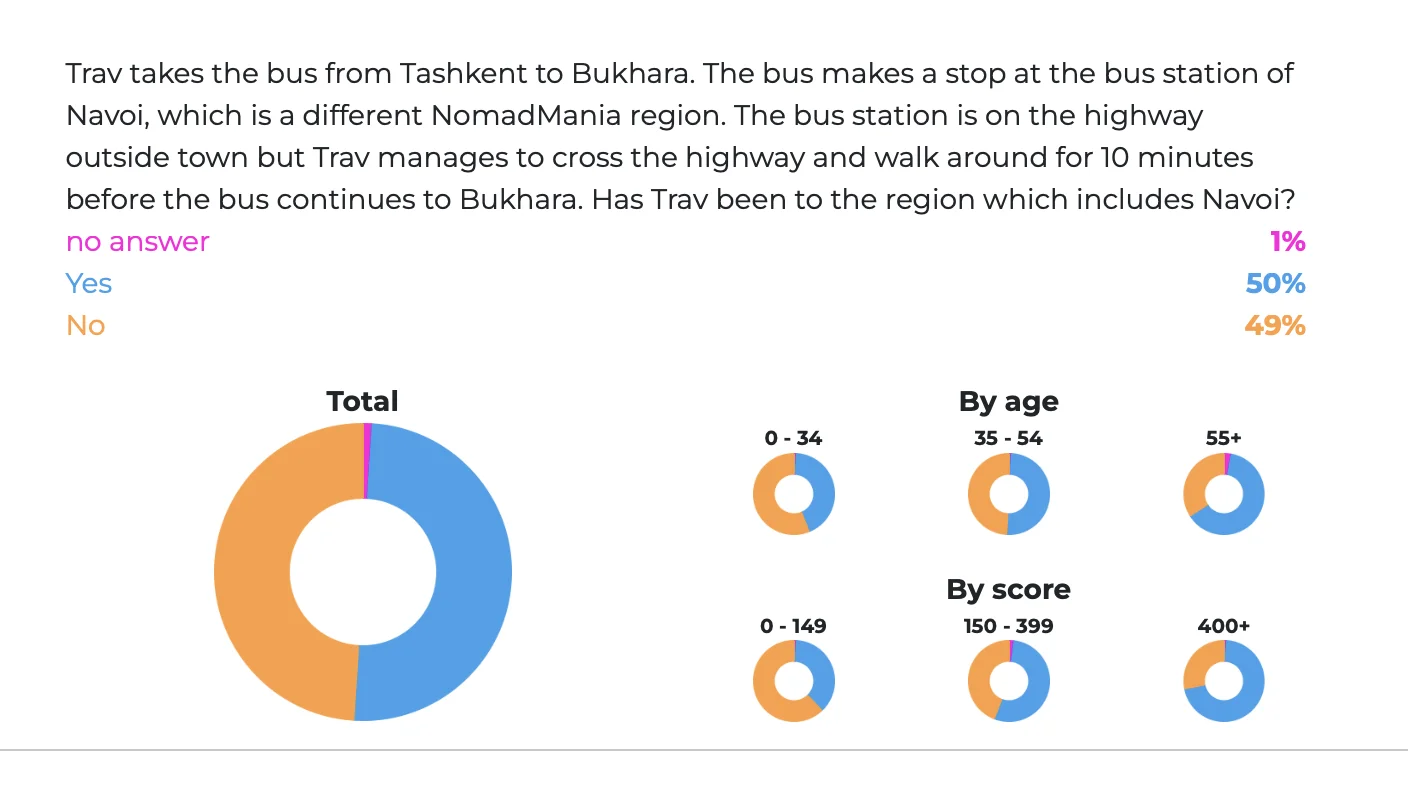
Another really close vote, whose result actually surprised us with its closeness, is the extreme example where Trav and Ling do not even remember their experience in a country because they were drunk. The aim of this question was to see the perceived significance of consciousness during a visit. This is also a 49-50% result, with the ‘no’ winning by the skin of its teeth.
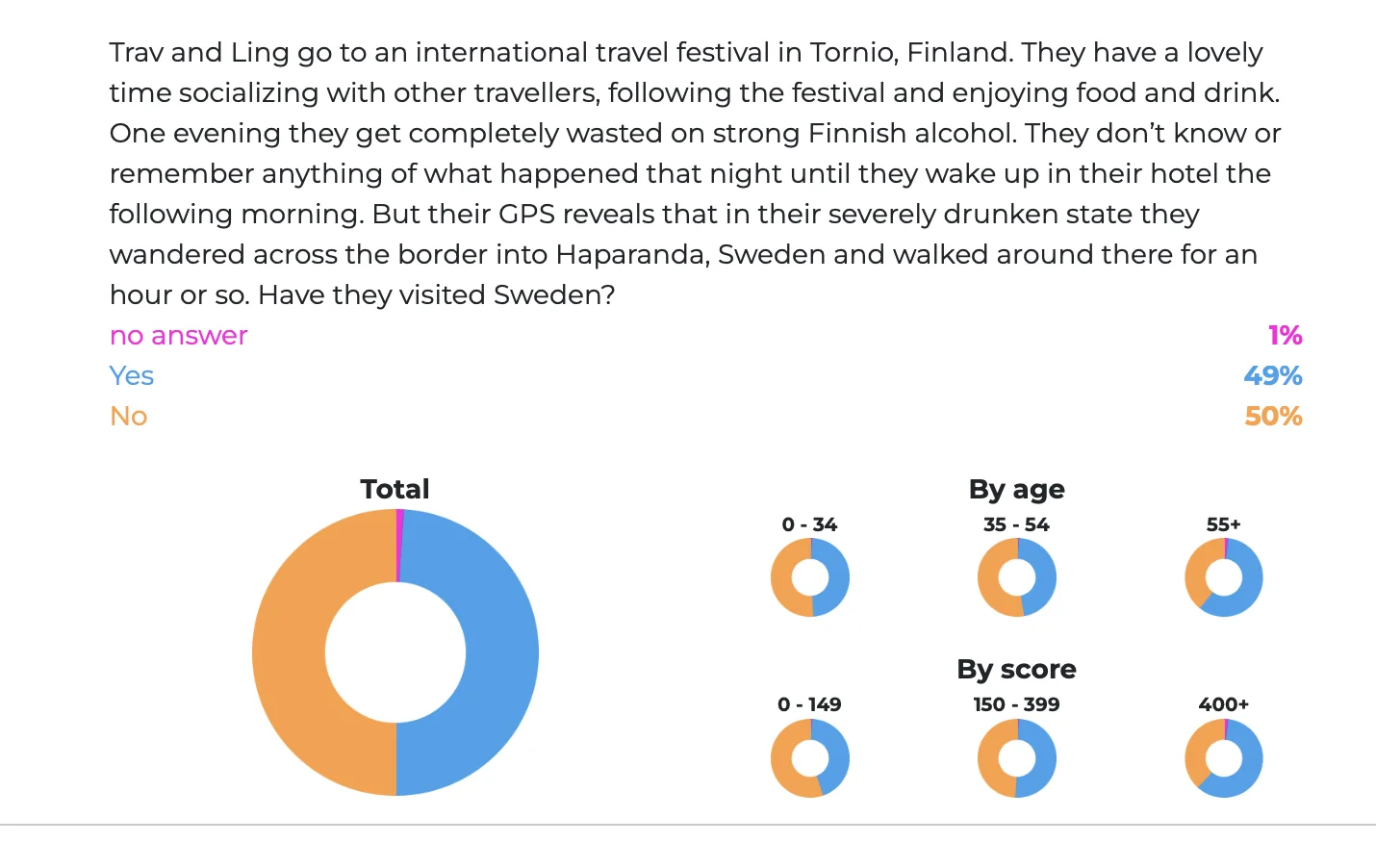
Interestingly as well, a pure business visit to a country, where nothing other than an office is really seen and experienced, is still considered a visit by 70% of our respondents.
Our poll then took a different direction by asking extremely specific questions in certain examples. An interesting one is at Bouvet Island. One scenario had our heroes land on a remote Antarctic island in a total fog, where they couldn’t see a thing. The other example had our heroes fail to land but they circumnavigate the island and see quite a lot of it. Interestingly here, in both cases the majority consider this a visit but the percentages are very different: when they land without seeing anything, this is 82%. When they don’t land but see a lot from afar, it is only 52%.
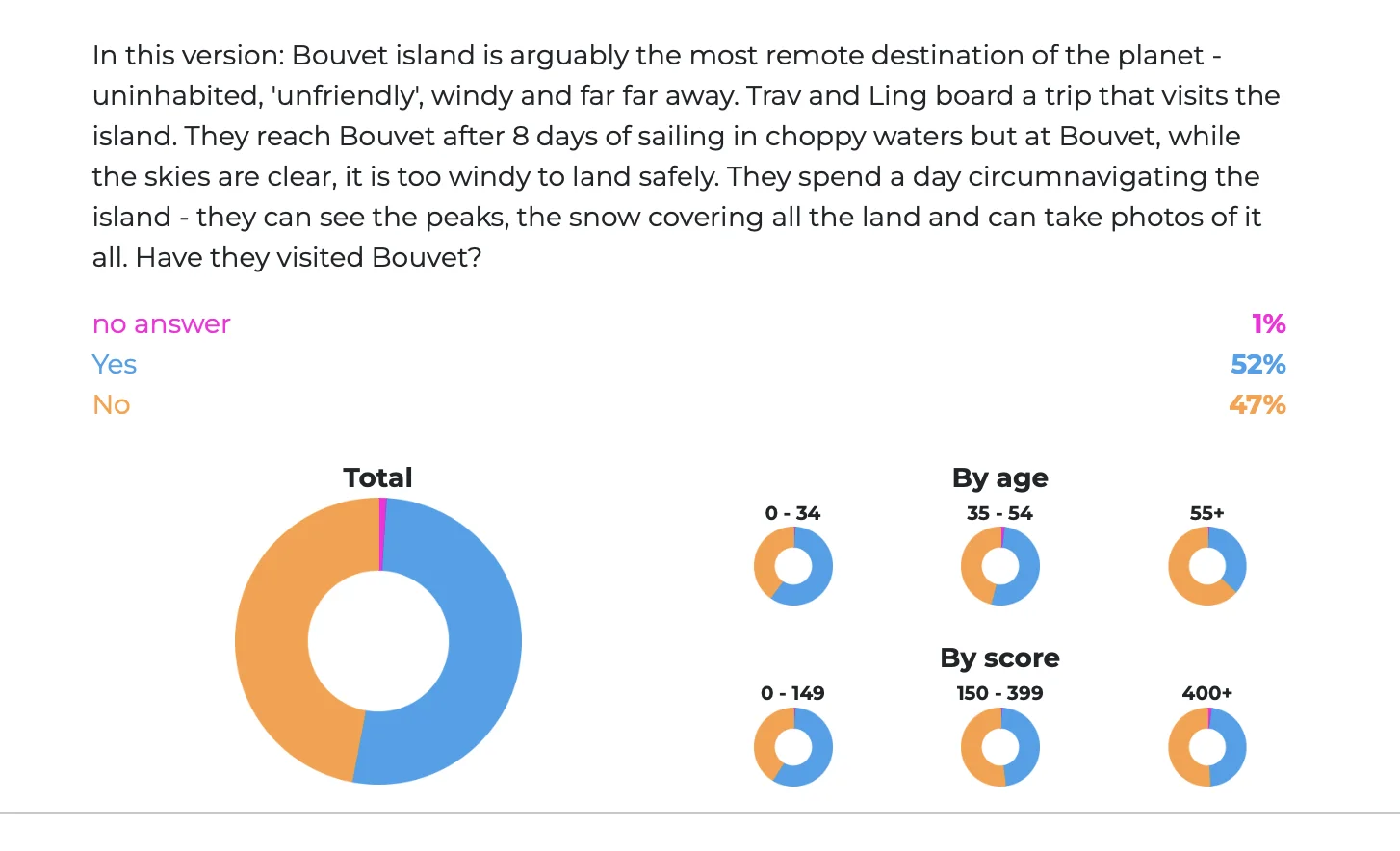
There are extremely interesting implications for our UN Masters from our specific questions about the DMZ (the demilitarized zone between North and South Korea), Karki (Azerbaijan exclave) and Golan Heights. Let us look specifically at this.
In the example of an exclave, Karki, which is de facto no longer part of the country even if it is de jure, 38% consider this a visit Azerbaijan and 61% reject this. What is interesting here is that even though technically Golan Heights would be the same example (an area which is de jure part of one nation but de facto belongs to another), only 12% accept this as a visit to Syria compared to a massive 87% rejecting this. Similarly, for the DMZ visit between the two Koreas, only 17% accept this as a visit to North Korea compared to 82% firmly rejecting it.
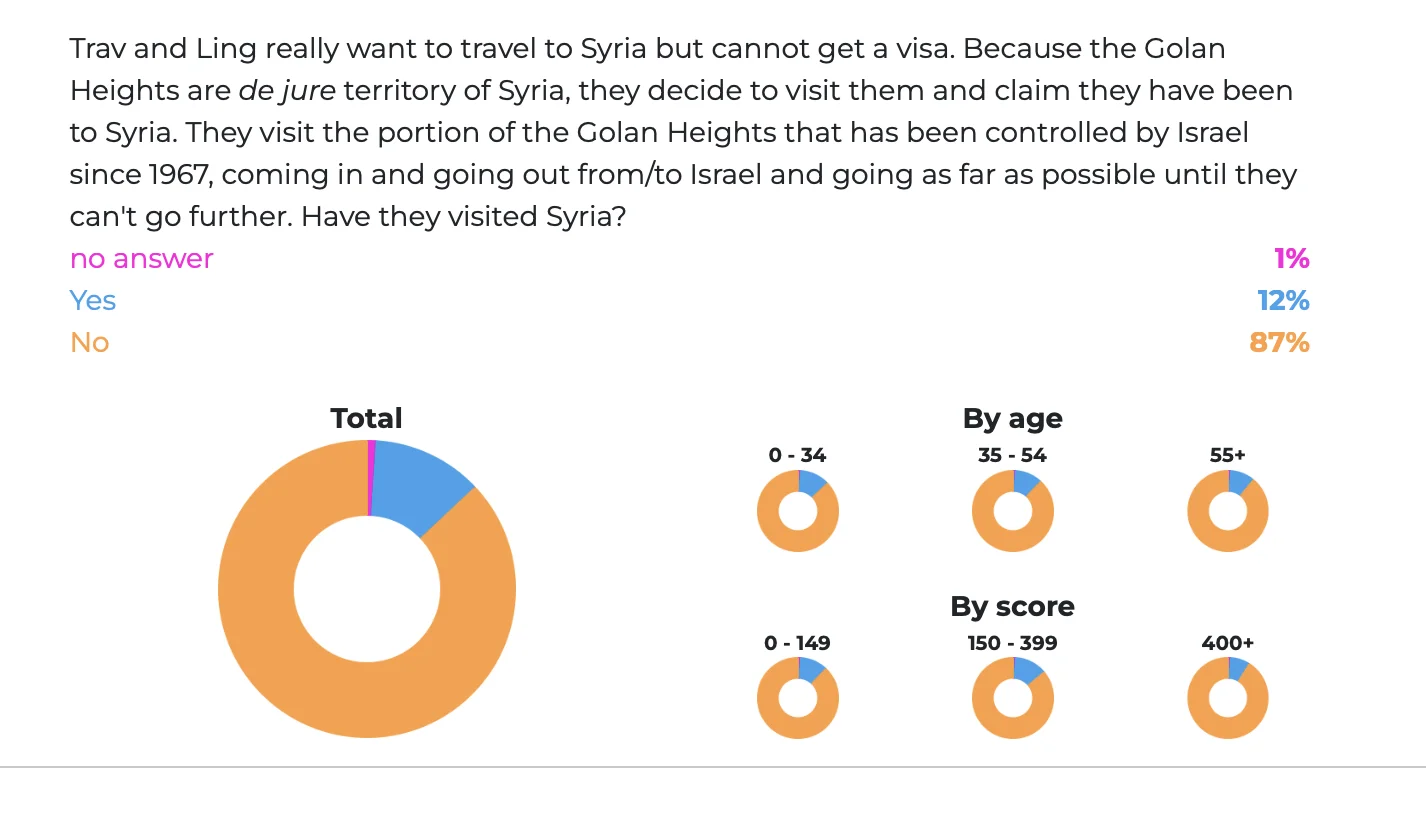
How will we use the results from ‘what is a visit’ polls?
All of this has long-reaching implications for a lot of what we do, as this is now a community vote and some of the results cannot possibly be disputed. In response to this, we would like to announce the following:
1. NomadMania will publish a definitive document within the next three months (this is a lot of work so we ask for your patience) where the parameters of what is a minimal visit are clearly outlined based on your vote.
2. NomadMania will, following a short review time, revisit all our verifications, especially for our travellers where there is concern that visits to North Korea and Syria may have involved only the DMZ and Golan Heights.
We will no longer accept legitimate UN Masters if a visit involves these areas and thus will move these travellers to the ‘Known to have transited’ rubric of our UN Masters list. We ask for a reasonable time for us to complete this without being intrusive.
We are committed to maintaining our credibility in line with our rules but since these will be outlined for the very first time now, we will give adequate time for everyone to understand and get used to them. Let us note that we will not accept arguments such as ‘Guinness accepts certain visits’ etc. We are not Guinness and our NomadMania community has clearly ‘spoken’.
3. We will be launching a new Golden Verification badge which will be an additional, up-to-date verification of our members (some of who got their badge as far back as 2014). After piloting, we will let you know when we can accept voluntary Golden verification, which we will ensure is indisputable, followed by ‘compulsory’ Golden verification for high-ranking members.
In conclusion, and perhaps rather surprisingly, we can say that the poll reveals that younger and less experienced travellers tend to be more concerned with a certain level of experience in travel – if this is achieved, they are more likely to count it as a visit including if there is no ‘stepping’ into the region. Older and bigger travellers tend to focus more on the ‘technical’ aspects of a visit – as long as a foot touches the ground, they are more likely to accept a visit even if very little has been experienced.

